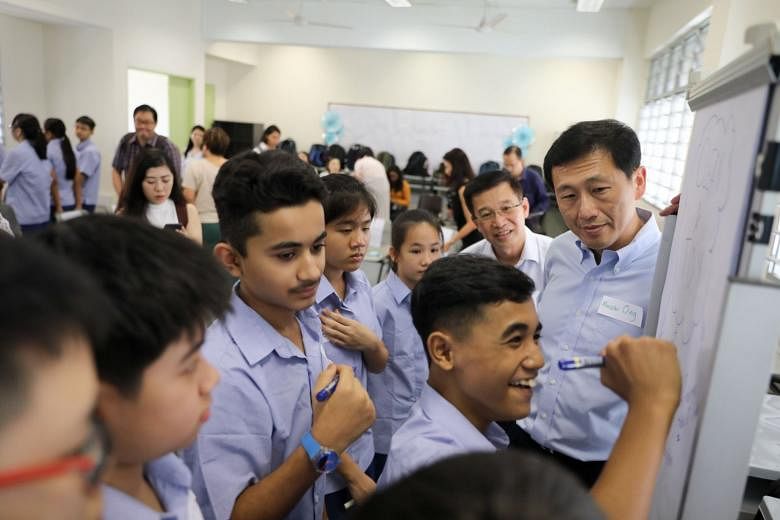SINGAPORE - For Secondary 1 student Zayeed Ibrahim, the start of the new school year on Thursday (Jan 2) was especially exciting because he was one of the first students in Singapore to have classmates from other academic streams.
The 13-year-old Normal (Technical) student is from Ping Yi Secondary School, one of 28 schools from this year to pilot full subject-based banding, start form classes with students of different streams, or do both.
"I'm happy because we'll get to spend time together in a class, but nervous because we haven't gotten to know each other. I hope we can be good friends," said Zayeed.
Education Minister Ong Ye Kung, who visited the school in Chai Chee, said the changes mark a "big step ahead for our education system", in helping students discover their potential and find their strengths.
The pilot schools are trying out a new Sec 1 class arrangement which sees students from different streams in the same form class.
The students will also take a common set of subjects, amounting to about a third of curriculum time, which include art, character and citizenship education, design and technology, and physical education.
This arrangement differs from the traditional way of sorting students according to the Express, Normal (Academic) and Normal (Technical) streams.
Ping Yi Secondary has four Sec 1 classes, each with 30 to 35 students from different streams.
Speaking to reporters at the school, Mr Ong said: "Each class is carefully composed of students from different streams, different ethnic backgrounds, different profiles, special needs students.
"If you are a stronger student, you benefit from the fact that you interact with students from many more different backgrounds, and I think you learn a very important value - you actually can play a part to teach other students who may not be keeping up as well in the academic subjects, and they in turn have something to teach you in other things in sports, in values, in various subjects."
He added that such changes to the education system are meant to help students break out of mindsets that constrain students' achievements and how they perceive themselves.
"In the long term, we want students to be more confident to discover, explore and develop their individual talents, and then with that, I think they're much more ready to move on to post-secondary education," said Mr Ong.
From this year, students at Ping Yi Secondary can also choose to study humanities subjects - geography, history and literature in English - at a more demanding level from Sec 2, if they have the aptitude.
Previously, options were limited to English, mathematics, science and mother tongue.
Two of the school's Normal (Academic) students are now taking geography at the Express level and three are reading Express-level history. They are all in Sec 2 this year.
Principal Ang Chee Seng said: "These students took humanities subjects at Sec 1, and based on their results last year, we are confident that they can cope with higher-level subjects."
Sec 2 student Lim Tie, 13, who is studying Express-level mathematics, geography, history and science this year, said: "I want to learn more and challenge myself... I like mathematics especially because it is useful for other subjects and I'm quick with numbers and mental calculations.
"I didn't expect to be able to take Express subjects. I thought Normal (Academic) is Normal (Academic) and that's nothing you can do about it," he said.
"In primary school, I was very playful. But now I like studying and I feel happy about it."
His classmate Hajamaideen Asimathul Jafriya, 13, is also taking four subjects - mathematics, science, geography and Tamil - at the Express level. She is keen to read geography to understand human action and its impact on the world we live in.
"Not everyone has the chance to take higher-level subjects so it's an amazing opportunity. I want to work harder to go to junior college or polytechnic, and work even harder there," she said.
The two-year pilot comes ahead of the roll-out of full subject-based banding to all secondary schools by 2024. The Normal and Express streams will be scrapped that same year.
The 28 schools were selected based on their readiness. They were involved in earlier phases of subject-based banding and have experience in supporting students of different learning abilities.
Teachers have been receiving training to customise learning to different needs of students, which sees them redesigning resources like assignments and worksheets.
Mr Ong said there will be challenges, such as working out class schedules.
Teachers, he said, will also have to cater to students of different abilities in one classroom. They will have to adjust to different learners and do more to encourage those who may need more help.
"Some students are more vocal, some students are more quiet, some more reserved, some less likely to participate... So the teacher (has to) actually make a conscious effort to draw out the students who are more reserved," he added.


